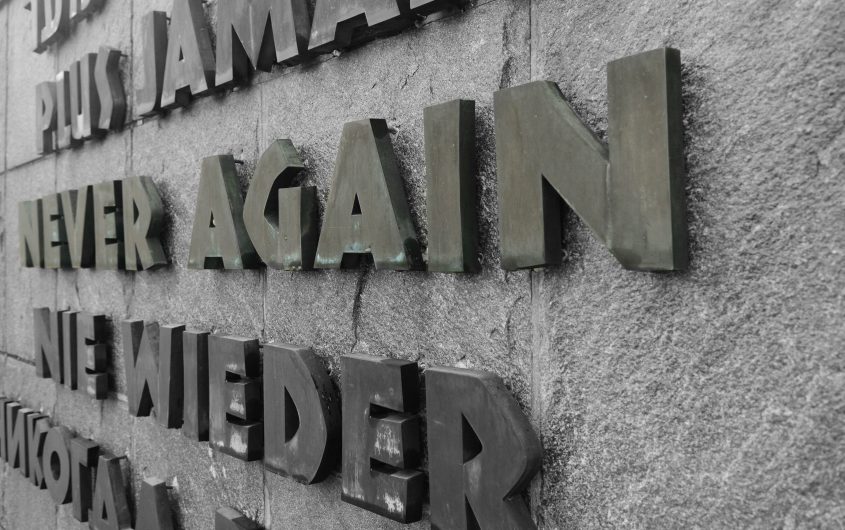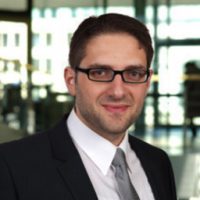
Never Again!

Ufuk Topkara
Humboldt University Berlin
Dr. Ufuk Topkara is Visiting Professor of Comparative Theology in an Islamic Perspective at the Berlin Institute for Islamic Theology, Humboldt University Berlin.
Dr. Topkara was a DAAD/AICGS Research Fellow from October to December 2018. He has been active in promoting inter-religious dialogue since 2005 as an expert on Islam for the Evangelical Academy Berlin, as a member of the Jewish-Turkish Roundtables for Dialogue, and with the Catholic Academy Berlin. Dr. Topkara was a Tour Guide at the Jewish Museum of Berlin from 2005 to 2015. He was a Humanity in Action Fellow in New York and worked in the U.S. House of Representatives as a Humanity in Action-Lantos Fellow in Washington, DC. He studied History and Philosophy at Humboldt University of Berlin and Harvard University. He completed his doctoral dissertation with the Graduate School of Islamic Theology at the University of Paderborn, Germany, analyzing the convergence of reason and faith in Islam.
While at AICGS, Dr. Topkara will conduct research on a project that emerges out of the interconnected strands of intellectual inquiry: comparing the experiences of discrimination faced by Jews in early twentieth century Germany and the experiences of discrimination faced by Muslims in contemporary Germany. By drawing parallels between the marginalization faced by these two religious minority groups, Dr. Topkara will provide a tool for combating rising anti-Semitism and anti-Muslim sentiment in both Germany and the United States today.
Dr. Topkara intends to showcase patterns of marginalization and othering of religious minorities in contemporary German society. A comparison between the Jewish community of the early twentieth century in Germany and contemporary Muslim community in Germany is particularly promising because of the inherent questions of belonging. Similar to the experience of German Jews in early modern times, German Muslims nowadays struggle with locating their place within German society. In both cases, the religious minority brought up questions of belonging that goes beyond citizenship, that is, the inclusion if not appreciation of cultural and religious differences.
A Historical Survey of Anti-Semitism in Germany between 1933 and 1935 and Implications for Contemporary Debates
When an anti-Semitic loner killed 11 members of a Jewish congregation in Pittsburgh in October, committing the deadliest act of anti-Semitic violence in U.S. history, people asked: is history repeating itself? Are there parallels to the time when a radical anti-Semitic ideology became state policy in Germany, ultimately paving the way to the destruction of European Jewry?
The expression “Never again!” denotes both a stern determination to fight modern forms of anti-Semitism and the willingness to keep historical memory alive. It also assumes, however implicitly, a comparability between contemporary forms of anti-Semitism and historical experiences, including the persecution perpetuated in Nazi Germany. Aside from methodological challenges that a comparison between different time periods invokes, a thorough examination of the historical circumstances remains indispensable. While many seminal works have shed light on numerous aspects of the rise and reign of anti-Semitism in Germany in the twentieth century, some historical sources remain understudied.
On December 13, 2019, DAAD/AGI Research Fellow Ufuk Topkara presented the findings of archival research conducted at the U.S. Holocaust Memorial Museum in Washington, DC, that examined the files of the Central Association of German Citizens of Jewish Faith (Centralverein deutscher Staatsbürger Jüdischen Glaubens, C.V.) in the period from 1933 to 1935. The archival research fits into a larger research project on social exclusion and discrimination of minorities in the U.S. and Germany that not only compares the two societies, but also compares historical instances with the present.
Historical Context
- When the German state was founded in 1871, German Jews were granted legal status as citizens, something that, despite their presence in German territory for centuries, was not previously granted to them.
- Despite the new legal status, social exclusion and othering still occurred.
- The term anti-Semitism emerged during the late 1870s and early 1880s during the Antisemitismusstreit.
- During this time, there were three predominant schools of thought of what to do to combat anti-Semitism: assimilation (drop Jewish identity and convert), emancipation (claiming space as German and Jew), and immigration.
- The Centralverein was founded in direct reaction to anti-Semitism and took the middle path between assimilation and emancipation to include as many Jewish perspectives as possible. The Centralverein sought to lobby for Jews in Germany and provide support to chapters all over Germany.
- The 1920s were an especially difficult time for German Jews. The C.V. was constantly fighting conspiracies and propaganda with facts and figures.
- In 1928, the C.V. began monitoring the national socialists by gathering propaganda, going to events, and compiling data on their activities.
1933-1935
- When the Nazis rose to power, the C.V. began to think about alternatives to assimilation and emancipation.
- The C.V. files contain not only reports by the branches of the Centralverein, which were sent to the headquarters in Berlin, but also the correspondence of individuals describing their experiences. It includes Centralverein policy strategies aimed at fighting discrimination.
- In 1933, notes to Berlin were less about the effects of the boycott on Jewish families and more urging the C.V. to do more to fight discrimination.
- In 1934 the personal notes are more frequently mentioning the effects of the boycott. The economic situation for many Jews has become dire and the C.V. is considering alternatives to assimilation and emancipation in Germany.
- By 1935, more and more individuals are joining the Zionist movement and beginning to leave Germany. The C.V. membership and newspaper subscriptions drop considerably. Most correspondence asks for advice.
Contemporary Implications
- Especially after the August 2017 violence in Charlottesville, many communities are asking if history is repeating itself.
- The situation now is not as dire as in the 1930s; we are nowhere near the level of othering, discrimination, and persecution.
- However, 18 to 20 percent of the population in Germany still holds anti-Semitic views. How do these notions still prevail and how can they be combatted?








